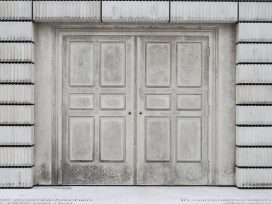Critics from all sides seem determined to dismiss the Universal Declaration of Human Rights as either vague posturing or dangerous leftism. So is it now time to send it to the great care home for failed utopias, that quiet place not in the sky but rather at the back of our minds, where Magna Carta, the Communist Manifesto, New Lanark and all the rest are quietly allowed to fade from memory?
The case for such committal might be thought a disturbingly long one. This is so even if we leave to one side the strongest point against – the mismatch between aspiration and practice in the field – and look only at what scholars have had to say. The anthropologists have always been deeply sceptical: as early as 1947, their American Association was complaining about the false universalism of human rights, its demand for a straitjacket, its “one size fits all” approach to rights which is inevitably insensitive to local culture and customs. This criticism has if anything gathered weight over the years as more and more parts of public and private life have been made the subject of conventions on this or that set of rights, drawn up by a community of cosmopolitan scholars whose links to many of the places affected by their formulations are often non-existent.
Development specialists have been historically uncertain as well, seeing the narrow focus of human rights as distracting from their grander project of large-scale material improvement. The lawyers’ complaint is the exact opposite: that the rights in the Universal Declaration are not properly enforced, that in the absence of a world court of human rights or at least an independent enforcement mechanism all the promises in the Declaration are mere empty charades, worse than useless in that they promise what it is quite impossible to deliver. The international relations specialists scoff smugly at such lawyerly naivety and say that this is the whole point: rights are a tool in international discourse, to be used by states to further their own interests – once it was the Helsinki Accords and Dr Sakharov, now it is humanitarian assistance and NATO bombings. Sociologists nod vigorously at this and recall Marx’s excoriating attack on rights as the flagships of human selfishness. Do not be misled by the plethora of crowded courses on human rights: the subject is regarded more disdainfully in the academy than the presence of all these enthusiastic students would suggest.
And yet, despite the double standards outside the academy and this range of scholarly doubts within, the Universal Declaration on Human Rights basks today in birthday acclaim as the greatest international agreement ever achieved. Nothing seems to have the capacity to topple this mission statement for humanity from its moral pedestal. The world views the 60th anniversary not only as a cause of celebration but also as an opportunity for an ethical health check: how are we faring by the standards our grandparents’ generation set for themselves?
There is more going on here than the critics see; in some important, subliminal sense the world needs the Universal Declaration of Human Rights. It is the conscience of a war-torn generation, placed on our shoulders as a guide to a better future and as an obstacle to the (re)doing of terrible wrong. So it remains very important to mark this anniversary by probing a bit more deeply than usual into what this document is really about.
The Universal Declaration does not shy away from ideas of right and wrong, and therefore of good and evil. An old-fashioned sense of certainty shines through its Preamble, with its grand recognition of the “inherent dignity and of the equal and inalienable rights of all members of the human family [as] the foundation of freedom, justice and peace in the world” and its ringing reaffirmation on behalf of “the peoples of the United Nations” of “their faith in fundamental human rights, in the dignity and worth of the human person and in the equal rights of men and women.” None of this is further explained, however: the only foundations offered are negative, the “disregard and contempt for human rights [that] have resulted in barbarous acts which have outraged the conscience of mankind” and the need to protect human rights by law so that the people of the world not be “compelled to have recourse, as a last resort, to rebellion against tyranny and oppression.” When the Declaration notes that the “advent of a world in which human beings shall enjoy freedom of speech and belief and freedom from fear and want has been proclaimed as the highest aspiration of the common people”, it does not go on to tell us why this should be so, where these freedoms come from and why we ought to be committed to them.
It is this vagueness on foundations that has exposed the Universal Declaration to some of the scholarly critique mentioned earlier – but the obfuscation was quite deliberate. The “dignity” and “worth” of the human person were well-known ideas at the time of its drafting and they performed the valuable function of taking the Declaration away from notions of the human person as composed only of that sub-set of persons within the category human who were properly autonomous persons in the sense of being able to think, communicate, make life plans for themselves and so on. There is quite a long tradition in human rights of distinguishing between humans in this way and – influenced by the horrors of the Nazis, no doubt – the declaration’s drafters clearly had no truck with it: its “human” is truly universal, and it has remained so in human rights ever since. We see the latest evidence of this in the recently agreed Convention on the rights of persons with disabilities, not something that Kant or Hobbes (much less Hitler or Himmler) would have contemplated.
The autonomous person may have been discarded but this still leaves open the meaning of “dignity” and “worth”. The universal application of these terms in pre-Declaration days had been largely associated with progressive elements within religious movements: the Dominican Bartolomé de Las Casas, for example, with his famous 16th-century defence of Native Americans. The Declaration appropriated this language, dispensed with its religious roots and sought to turn it to long-lasting secular effect. But can respect for universal human dignity thrive without its religious roots? At bottom the scholarly critique draws its force from the assumption that it cannot. Underpinning human rights in this way is one of the most important tasks facing the subject as it looks to its next 60 years.
I believe that this is achievable. The term “dignity” is one that, as Christopher McCrudden has astutely observed, is capable of having “several meanings” and “one cannot coherently hold all of them at the same time”. So we are in the realm of choice here, deciding which signification to impute to this floating phrase. My chosen version of dignity – the one I argue we should ascribe to the word in the Declaration – emerges from a combination of the natural and the learnt. There is in all of us an instinct for hospitality, for cooperation, for outreach to the stranger. True, it is not the only instinct that we have, and there are others – for the safety/survival of our own family/community members, for loyalty to our group, for example – which might run counter to it. But it is there, as – surely we can say this without absurdity? – a constant feature of human conduct since the first interactions of the species.
Whether the instinct thrives or fails depends on the social soil in which its bearers find themselves growing. If the social institutions they inherit are weak and fragile, if their world is a place of insecurity, violence and disorder, then the instinct will manifest itself as only a dim echo of what, in better times, it might have been. Occasionally, the structures of everyday life are so poisoned that, as was the case in Nazi Germany and in Rwanda in the early 1990s, there is almost no room for solidarity with the stranger to express itself at all: in such doom-laden situations there is the institutionalisation in law and/or social practice of instincts which are aggressively hostile to universal hospitality.
More normal is the situation – across history, across cultures – where our various instincts run up against each other: we are inclined to hospitality, but also to loyalty, to reach out to the stranger one minute but to pull up the drawbridge the next. Something in us knows this to be the case and knows also that the instinct for self/kin-preservation is a strong one whereas that of empathy with the outsider is in contrast relatively weak. So to keep our selfish instinct in some kind of check, to give hospitality a fighting chance, ideas of unselfishness have not only emerged in the minds of quixotic idealists but have taken root as well in the form of structures of governance and of behaviour which have been influential in the conduct of life, by individuals, by family groups, by community members, by whole societies.
On this analysis the consistent interest in human dignity shown by many of the world’s large religions is not necessarily a consequence of some great truth delivered from on high; but neither is it inevitably an exercise in bad faith, mocked by the actual conduct of the leaders of such faith groups. Instead, for those among us unable to embrace the faith explanation, such concern for dignity can be respected, admired even, as an effort to put into words and to structure a response to the instinct for hospitality that is in us all, prior to faith. The imperfection of its realisation – within as well as outside such churches – merely attests to the fact that there are other rival claims on our feelings which are less benign so far as “the other” outside ourselves and our community is concerned. On this reading, Kant’s restructuring of morality to produce a non-Christian explanation for an ethic of respect for the dignity of the other becomes not the truth in itself that he and his followers thought they had found but rather a different kind of camouflage for the real motive for such a categorical imperative, which was the demands not of reason alone but of a certain kind of instinct revealed via reason.
The same kind of analysis can be made of socialism (why worry about the poor in the first place?), Rawlsian liberalism (the original position and all that stuff) and (this is the key point) most recently the prevalent idea of human dignity as the concept underpinning our “human rights”. They are all workings-out, more or less persuasive depending on when they are formulated and the fertility of the soil on which they are spread, of this basic instinct of solidarity with the other, which is the true core of human rights. And because it is generally the poor and unlucky who need us to see them (the rich having quite enough visibility as it is), the project of human rights promotion becomes in practice one committed to a preference for the disempowered, the unlucky, the disadvantaged, life’s lowest human stratum.
Such an approach allows critical engagement not only with rival instincts but also with how the instincts play out in the structures of solidarity themselves. We can see clearly that just as religious movements can abuse the idea of human rights by turning it into a set of perks available only to believers (and perhaps even only male believers), so too can human rights organisations stray from the path of “true” human dignity by using their ethical cachet to trap volunteers into poor working conditions or by allowing their sense of moral superiority to blind them to the bullying employment culture that has been allowed to take root behind the scenes. An easier spot is the use made of the term “human rights” to underpin the values of a particular civilisation – this contradiction in terms has the effect of allowing the coercion of suspects and the lawless invasion of states in the name of a universalism that has shed its engagement with the dignity of the individual and in so doing has become incoherently partisan.
The establishment of a foundational basis for human rights which is not limited to the religious, but to which progressive elements within religious movements could subscribe, is a vital project if human rights is to enjoy a further 60 years of institutional and activist growth. It is also vital if the critics in the academy are to be successfully tempted on board. The gamble the human rights intellectual takes is that the era of postmodernism is drawing to a close, that the progressive elements in the West have rediscovered the need to counter the disagreeable truths of others with more than a shrug of the shoulders and the scholarly equivalent of “whatever”. If this is the case, and if the legacy of the wrongs done and being done by faith groups still makes even progressive religion impossible for many, then human rights – with its confident commitment to a dignity which is rooted in human instinct and unfolded through embedded social practices – offers as good a guide to secular salvation as we are likely to find.





